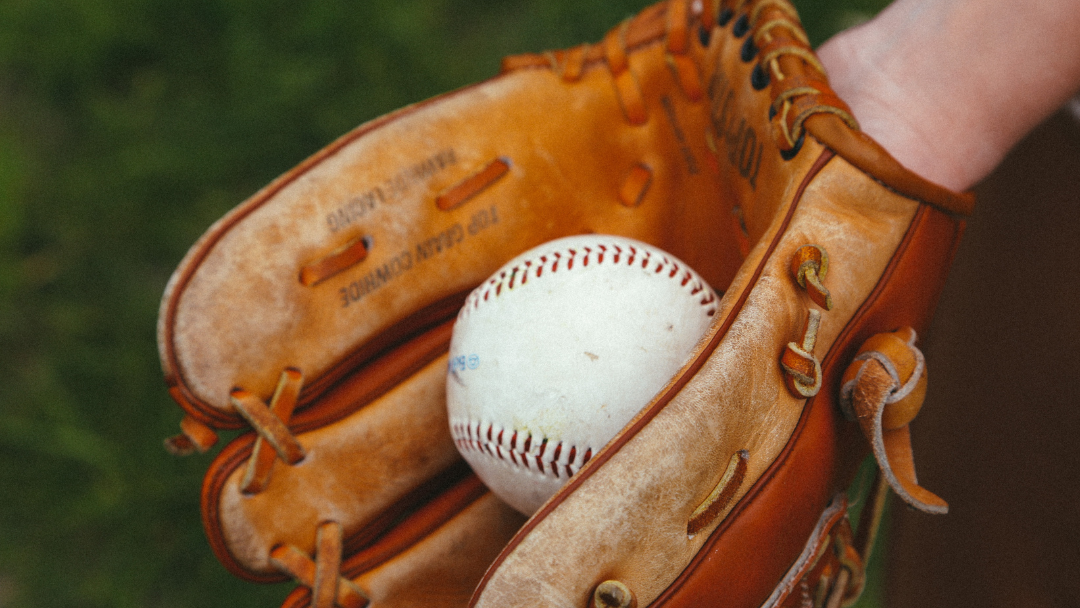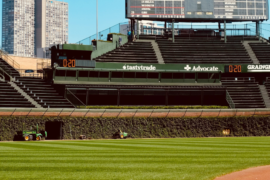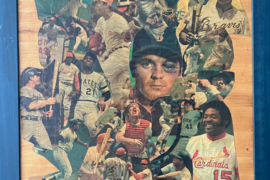By the spring of our freshman year of high school, Jimmy had been afforded sufficient opportunity to showcase his general—which is to say, abject and uncorrectable—lack of athleticism. Even under the pedagogical oversight of our Phys. Ed. teacher, the one-upmanship of boyhood rendered vital our games of badminton and volleyball throughout the school year, and, as these served as our primary means of appraising each other’s capabilities and, thus, social worth, Jimmy’s apparent deficiencies often sustained the brunt of our humor. The stakes were high then – nothing less precious than the conservation of our egos – and his inability to prove himself in the heat of even inconsequential competition earned him our mockery, which, as harmless or “good-natured” as we thought it then, was merciless.
Consequently, I remember our surprise when he showed up for tryouts on that first chilly afternoon of the spring sports season. So far as we knew, he had never played baseball in any organized capacity, and while our high school was by no stretch of the imagination a powerhouse on the local scholastic circuit, most of us had already logged experience at the Babe Ruth League and Junior Legion levels, not to mention those requisite years in Little League when we first learned the game. Per these factors, then, his decision to try his hand at our game was foreseeably ill-fated.
Because ours was a private school unaffiliated with any one feeder system, our athletic teams comprised a hodgepodge of students from a number of surrounding districts. Most of us had not shared any common on-field experience prior, and with that first opportunity, I recall my eventual teammates and I feeling especially eager to prove, not only to our coaches but to each other, our belonging.
At some point during one of the drills, a coach chipped a blooper toward right field, where Jimmy happened to be. Perhaps a well-meaning coach had stationed him there earlier that afternoon, or, presuming the position involved comparatively less action, perhaps Jimmy himself had slunk out there, hoping his incompetence might remain conveniently unobtrusive. Regardless, he had been called upon, and we, scattered across the diamond from our different vantage points, watched with an attentiveness that I am sure none of us afforded any other teammate that day.
Tracing the ball’s arc, Jimmy sprinted toward the infield and situated himself directly beneath its descent; he even remembered to raise his throwing arm so as to secure the catch. Until that point, he had fielded a fly ball as adequately as one could expect from any neophyte outfielder attempting to play at a level requiring some semblance of skill. His anticipation, his reaction, his mechanics: the minutiae that render such plays routine Jimmy managed to account for in admirable fashion.
And then, to our sheer delight, he missed it.
The incoming ball nicked the web of his glove and caromed off of his forehead at an angle I vividly recall—even now some twenty years later—as spectacularly cartoonish. From my stance at second base, where I had dutifully positioned myself as his cutoff, I recall Jimmy immediately dropping to the cold, still hardened ground where he remained motionless and spreadeagle while a coach trotted out there to ensure his well-being. Not coincidentally, several of us were also sprawled on the ground by that point, unable to remain standing for the exertion of our laughter.
I am sure practice continued, but I do not recall anything after. I do not recall whether Jimmy persevered or sat out the remainder of the drills that day. I do not recall if he voluntarily withdrew from the following days’ tryouts or if he was informed by the coach at some point shortly after this incident that he did not make the cut. In fact, I do not recall much more about that entire first season of varsity baseball. But my memory of this mishap has since assumed an almost cinematic quality, with the lofted ball seeming to drift along its parabolic rise and drop, Jimmy tracking it in slow motion, and a panoramic view of the rest of us all turned toward his corner of the field to watch it unfold.
Now, with the benefit of hindsight, I have difficulty not contextualizing this scenario, as if he recognized that catching a baseball on the run was an opportunity to redeem his stature among us. Though we did not acknowledge it then nor could we have articulated it in any explicit terms, that social structure customary to one’s secondary educational experience had already been established, and the degree of one’s competitive prowess had emerged as the commodity by which we interacted and measured each other’s value. In that fashion typical of adolescent boys insecure in their own homosocial standing, we had been quick that year to assert our places with the banter and proverbial chest-thumping of pubescent hypermasculinity, and Jimmy, for being audaciously, unforgivably unathletic, had reaffirmed his appointed rank within our stupid, short-sighted hierarchy.
Only in recent years, since becoming a father myself, have I come to appreciate what accomplishing a feat as basic as shagging a fly ball necessitates, much less fielding a hard-hit grounder or snagging a line drive or even charging a bunt: such skills are often honed at the expense of other more immediate, quotidian responsibilities and, certainly in my case, the attention of others. Rarely was my dad unavailable to throw with me in our backyard, and when on those occasions I was relegated to pinging a tennis ball against our front steps alone, I was applying those fundamental fielding techniques he had suggested earlier. Similarly, my grandfather would regularly toss the ball back and forth with me in the alleyway behind his house, at least until his shoulder stiffened up and he would have to set aside his glove for the remainder of the afternoon. I remember on at least one occasion even my mom acceding to my request to play catch, which was an especially generous sacrifice given the fact that she did not know nor care much about the game.
I do not know if Jimmy’s childhood was similar in this respect. While I was outside learning from my dad how to catch a fly ball, maybe—like many other kids I knew—Jimmy was tinkering under the hood of a car with his dad, say, or building the components of a circuit board. I do not know. Perhaps he had never before our freshman year expressed to anyone his interest in baseball; perhaps no one he knew had ever been interested enough in the game to share it with him; perhaps prior to this he had in fact expressed interest in it, and somebody—knowing that catching a baseball entails possessing some passable hand-eye coordination and knowing that nature is as equally potent a force as nurture—encouraged him to explore some other hobby, perhaps one that he was content enough to enjoy until he became aware in early high school that to belong suddenly meant to be able to play a sport. This is only supposition, of course, and I do not know if it is even fair supposition.
I do know, however, the extraordinary privilege of someone else’s generosity, and only because of this did being able to catch a baseball seem ordinary to me back then. For reasons that I do not know, Jimmy’s family had begun to dissolve around that first year of high school, and by the time we graduated, his home life was by all appearances far less stable than mine. In this light, I took much too easily for granted then the simple wonder of learning how to do something from someone who cared enough to provide such instruction. I recognize this now not because I am grateful for having never taken a fly ball to my face for the amusement of my insecure and undiscriminating peers, nor because I was especially successful—for all of the years that I enjoyed the game, I was only talented enough to play at a small Division III college, which is to say that I was not exceptionally talented at all—but, presumptions regarding Jimmy’s upbringing aside, because my childhood was probably less normal than I assumed then.
Now, three of my four sons live and breathe the sport; I presume that my youngest, when he is old enough, will share his brothers’ enthusiasm as well. As my father once did with me and my grandfather did with him, I can expect to find myself on any given weeknight or Saturday afternoon entertaining my boys’ requests to throw in our backyard or pitch to them at one of the nearby ballfields. These informal sessions, of course, we must accommodate between their increasingly busy schedules of team practices and matchups. And while they still have before them an infinite host of variables that will influence their makeup and eventual pursuits, I can foresee each of them over the years continuing to seek some degree of fulfillment in the game.
Baseball was never more than that to me: a game, albeit an immensely enjoyable one. But even in its most purely recreational form it furnished opportunities I wish I had perceived when I was fortunate enough to play. To enjoy it as one’s own pastime—actively, apart from our passive use of the term for its entertainment and spectatorial payoff—is often the culmination of someone else’s efforts. I do not know if Jimmy was ever fortunate enough to be given that, but I am glad that I was.
JARED BIER is a high school English teacher. His writing has appeared in various publications, including PopMatters, The Purpled Nail and Trails.
Like what you’re reading?
Get new stories, sports musings, or book reviews sent to your inbox. Drop your email below to start >>>
NEW book release
Ghosts Caught on Film by Barrett Bowlin. Order the book of which Dan Chaon says “is a thrilling first collection that marks a beginning for a major talent.”
GET THE BOOK



